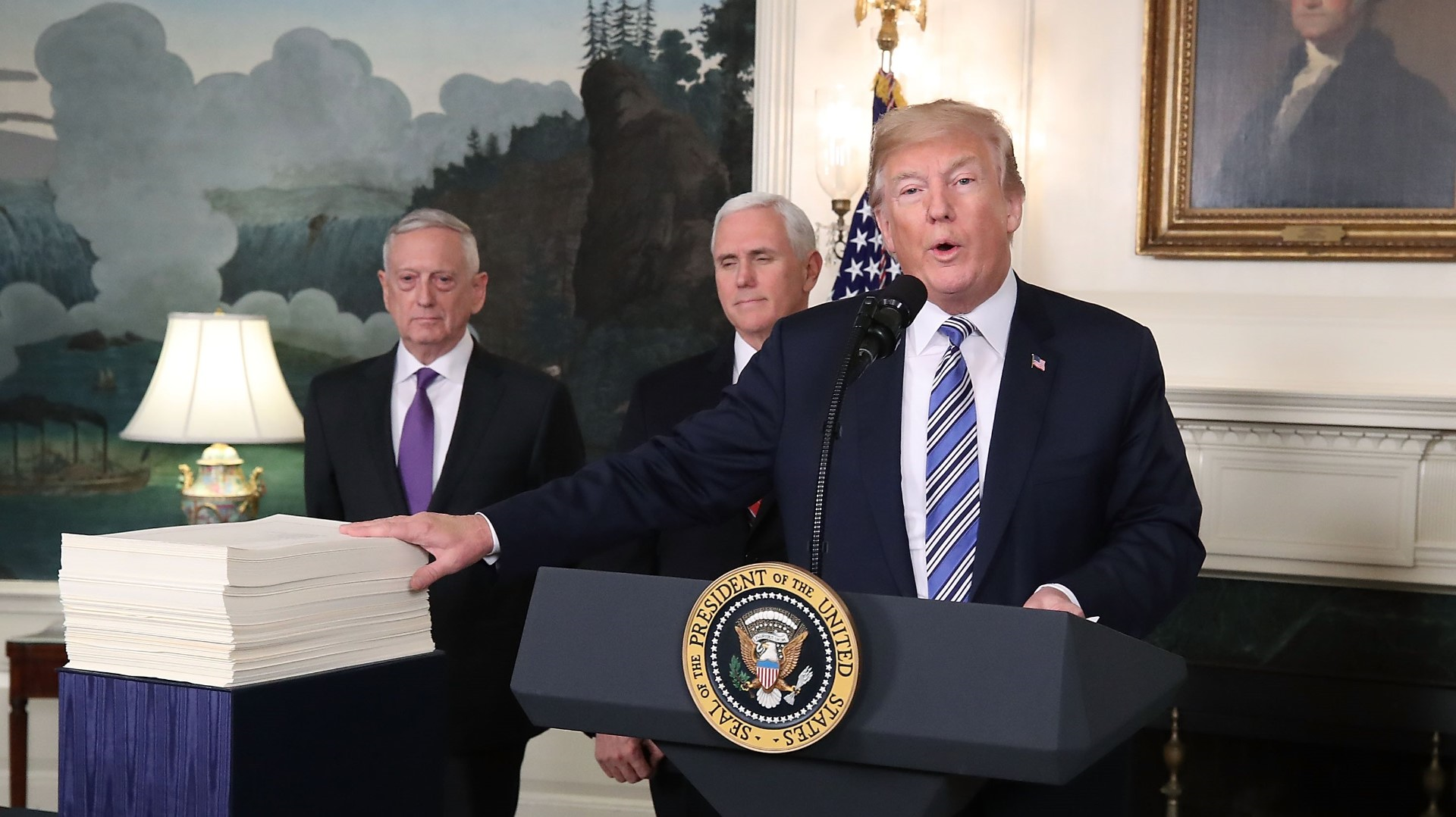President Trump signed a massive $1.3 trillion spending bill released Friday, which funds the federal government for the remainder of the fiscal year, which ends September 30.
Here are four key items that are in the bill — and two big things that were left out:
Gun violence
In an effort to address gun deaths, negotiators included a bipartisan proposal to boost compliance with the National Instant Criminal Background Check System. Called “Fix NICS,” the bill emerged as a response to a Texas church massacre in November that might have been prevented if authorities had reported the shooter's violent history.
The measure would penalize federal agencies that fail to report relevant records and provide incentives to states to improve their overall reporting to NICS. It would also direct more federal funding to boost the accuracy of domestic violence records.
The spending bill also includes one sentence clarifying that the Centers for Disease Control and Prevention can conduct research on the causes of gun violence. The CDC stopped investigating that issue after Congress passed a 1996 amendment banning the agency from using any federal dollars to “advocate or promote gun control.”
Critics say that 1996 language had a “chilling effect” on research that has lasted more than two decades. The omnibus addresses that complaint by stating the CDC "has the authority to conduct research on the causes of gun violence."
A tax law fix
Remember the tax law Republicans passed last year? Well, it included at least one glitch that has some grain companies fuming. The law allows some farmers to deduct 20% of their gross sales if they sell their goods to farming cooperatives, but only 20% of net income if they sell to corporations.
For-profit grain companies said that puts them at a competitive disadvantage because farmers would be more inclined to sell to cooperatives. Republicans wanted to fix that disparity, and they were successful. Now farmers can sell to cooperatives or corporations and get the larger break.
Immigration enforcement
President Trump wanted the bill to include $25 billion for his long-promised wall along the U.S.-Mexico border. He got $641 million for about 33 miles of new border "fencing" and levees, plus nearly $1.3 billion for border-security technology.
Trump also wanted money to hire more immigration agents to ramp up deportations, and funding for more detention beds. Neither of those is in the final deal but Republicans did secure a bump in funding for the Immigration and Customs Enforcement agency.
Democrats wanted legal protections for the DREAMers, undocumented immigrants who came to the U.S. as children. The DREAMers and the wall funding were the subject of intense negotiations over the weekend but nothing came to fruition.
The Gateway project
The spending bill includes millions of dollars for a high-profile infrastructure project that Trump opposes — a long-planned tunnel between New Jersey and Manhattan known as the Gateway project. Trump reportedly threatened to veto the spending bill if it included money for the tunnel.
But that project is a major priority for the Senate Democratic leader, Charles Schumer of New York, as well as Rep. Rodney Frelinghuysen of New Jersey, the Republican chairman of the House Appropriations Committee. More than $500 million in federal funding would be available to go toward constructing the tunnel under the Hudson River.
The money won’t be labeled “Gateway Tunnel,” but it will be distributed to several grant programs, which can fund the project without approval from the Trump Administration. Despite being a life-long New Yorker, Trump has opposed the $30 billion project and urged GOP leaders not to put it in the spending bill.
Sexual harassment and discrimination
The bill does not include a bipartisan provision that would have overhauled the way Congress handles allegations of sexual harassment and discrimination. Similar legislation already passed unanimously by a voice vote in the House, but has been held up in the Senate. Many lawmakers expected the language to make it into the must-pass spending bill.
“I can’t think of any legitimate reason to remove this language other than to protect members of Congress over taxpayers and congressional employees,” Sen. Kirsten Gillibrand, D-N.Y., said this week. Gillibrand is the lead sponsor of the Senate version of the Congressional Harassment Reform Act, which has 30 bipartisan co-sponsors and was expected to be the starting point for the language in the bill.
Health care subsidies
Another provision that didn't make it into the final text is a GOP plan to stabilize Obamacare health insurance markets and help provide coverage for patients with high medical costs. The proposal would have reinstated government subsidies paid to health insurers, a program Trump had ended. It also would have provided funding to help states set up high-risk insurance pools to provide coverage for people with high medical costs.
The plan included provisions that had been hashed out on a bipartisan basis, but Republicans included language that would ban the federal funds from being used toward abortions, which Democrats said was a non-starter. On the other end, fiscal conservatives said the bill amounted to a payout to insurance companies.
What Washington's top lawmakers are touting:
Senator Patty Murray, D-Washington:
- $2.37 billion increase to the Child Care Development Block Grant, totaling $5.226 billion, which doubles amount of funding for child care for low-income working families; also increased Head Start funding by $610 million, to total $9.863 billion
- $20 million for fisheries disasters
- $2.4 billion for nuclear waste cleanup at Hanford
- $1.5 billion for TIGER grants
- $2.64 billion for Capital Investment Grants
- $1.3 billion to support Amtrak’s National Network including long-distance routes, like the Coast Starlight and Empire Builder that runs through Washington
- $50 million for railroad safety technology, including Positive Train Control implementation
- $8 million in grant money for Sexual Assault Examiner Nurse training
- More than $3 billion in funding for the opioid epidemic, which includes money for treatment, prevention and research programs focused on opioid addiction. Bill directs additional resources to rural or underserved areas
Senator Maria Cantwell, D-Washington:
- New emergency funding account for use in bad fire years of around $2 billion a year through 2027
- New legislation aimed at ending the practice of “fire-borrowing,” in which federal agencies such as the Forest Service use money intended for risk prevention to fund firefighting instead
- Expands the ability for States to partner with the Forest Service and the Bureau of Land Management (BLM) for wildfire prevention, including fuel reduction and restoration projects
- Increase to Low Income Tax Credit program by 12.5%, which translates into around 3 billion dollars in funding. That program is designed to incentivize investment in low-income housing
Cathy McMorris Rodgers, R-Washington
- Also fought for the new fire-borrowing legislation
- Two-year extension of “Secure Rural Schools” program which helps fund infrastructure and law enforcement needs
- Funding for rural broadband service expansion, $685 million dollars
- Fix for “grain glitch” in new GOP tax law
- More than $654 billion in defense spending, including a 2.4 percent pay raise for troops.
- $81.5 billion for the Department of Veterans Affairs, including funding to reduce the backlog of claims and care
- $492 million for Violence Against Women Act (VAWA) grants program administered through the Department of Justice, an increase of more than $10 million
Contributing: Michael Collins and Nicole Guadiano


